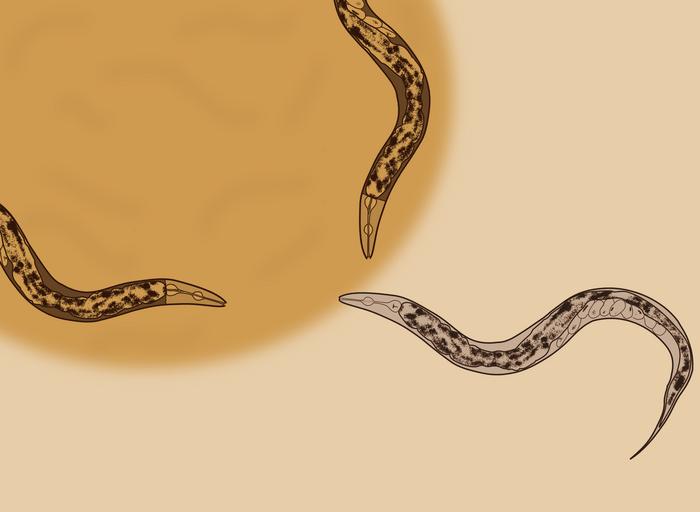LA JOLLA (July 11, 2023)—The life of the tiny worm called Caenorhabditis elegans consists mostly of looking for food, eating food, and laying eggs. So, when any of these behaviors are disrupted, there’s cause for concern. In a new study, Salk Institute scientists discovered that the “feel good” brain chemical dopamine regulates anxious worm behavior in the presence of nipping predators.

Credit: Salk Institute
LA JOLLA (July 11, 2023)—The life of the tiny worm called Caenorhabditis elegans consists mostly of looking for food, eating food, and laying eggs. So, when any of these behaviors are disrupted, there’s cause for concern. In a new study, Salk Institute scientists discovered that the “feel good” brain chemical dopamine regulates anxious worm behavior in the presence of nipping predators.
The findings, published in eLife on July 11, 2023, illuminate how this dopamine-regulated brain pathway may be related to anxiety and could provide insight into human conditions, such as post-traumatic stress disorder (PTSD).
“Worms are a wonderful model for studying anxiety because the cause of their anxiety is typically known, like predation,” says Professor Sreekanth Chalasani, senior author of the new work. “Thus, we can use worms to better understand fundamental neural pathways related to anxiety and stress responses that could be conserved across species.”
In this study, the researchers observed what happened when a predator worm species (Pristionchus pacificus) nipped at the worms, discouraging the worms from eating the food source. In response, the worms moved away from the food source, and the predators were able to eat more. Additionally, the worms also laid their eggs away from the old food source and the threat of predation.
The researchers noticed that the worms would stay away even after the predators had left—indicating the worms were learning that it was safer to stay away. Furthermore, the behavior of laying the eggs far away from predators was regulated by dopamine. But when the researchers blocked dopamine pathways in the worms, they did not avoid predators as frequently to lay their eggs.
“To understand how the brain works, it is important to study it in its natural context,” says co-first author Amy Pribadi, a former graduate student researcher in Chalasani’s lab. “To do that, we can use a simple worm with an easily constructed natural environment, then look at how that worm’s brain networks and molecules modulate behavior in that ‘natural’ environment.”
Additionally, the researchers explored how the presence of smaller patches of food away from the main food source impacted worm-predator interactions. While predators were busy monopolizing a main food source, the presence of alternate (albeit smaller) food sources elsewhere made the worms more likely to avoid predators.
“Worms make decisions based on environmental changes similar to more complex animals and humans,” says co-first author Michael Rieger, a postdoctoral researcher in Chalasani’s lab. “Difficulty adapting to change—especially due to threat or stress—is common in humans, especially those with neurological disorders. Our research in this simple organism reveals new avenues for exploring the neuroscience of decision-making, which we hope can generalize all the way up the food chain to humans.”
In the future, the team will examine the role of another brain chemical called serotonin in this evasive behavior, since serotonin is known to regulate other dopamine-dependent behaviors, like searching for food. They also hope their study serves as a springboard for future inquiry into the impact of other brain signaling pathways that influence feeding, reproduction, and other behaviors.
“By looking at worms, you capture so much intricate biology in an animal that has evolved over billions of years,” says Chalasani. “Any insight—even in worms—into the mechanisms of predator-prey behaviors enriches our understanding of so many other phenomena that exhibit this biological push-pull relationship, like the co-evolution of animals and their environment or the delicate balance of chemical conversations between cells.”
Other authors include Kaila Rosales and Kirthi C. Reddy of Salk.
The work was supported by a National Science Foundation Graduate Research Fellowship, an Innovation Grant from Kavli Institute of Brain and Mind, and the National Institutes of Health (R01 MH113905).
About the Salk Institute for Biological Studies:
Unlocking the secrets of life itself is the driving force behind the Salk Institute. Our team of world-class, award-winning scientists pushes the boundaries of knowledge in areas such as neuroscience, cancer research, aging, immunobiology, plant biology, computational biology, and more. Founded by Jonas Salk, developer of the first safe and effective polio vaccine, the Institute is an independent, nonprofit research organization and architectural landmark: small by choice, intimate by nature, and fearless in the face of any challenge. Learn more at www.salk.edu.
Journal
eLife
DOI
10.7554/eLife.83957
Method of Research
Experimental study
Subject of Research
Animals
Article Title
Dopamine signaling regulates predator-driven changes in Caenorhabditis elegans’ egg laying behavior
Article Publication Date
11-Jul-2023




